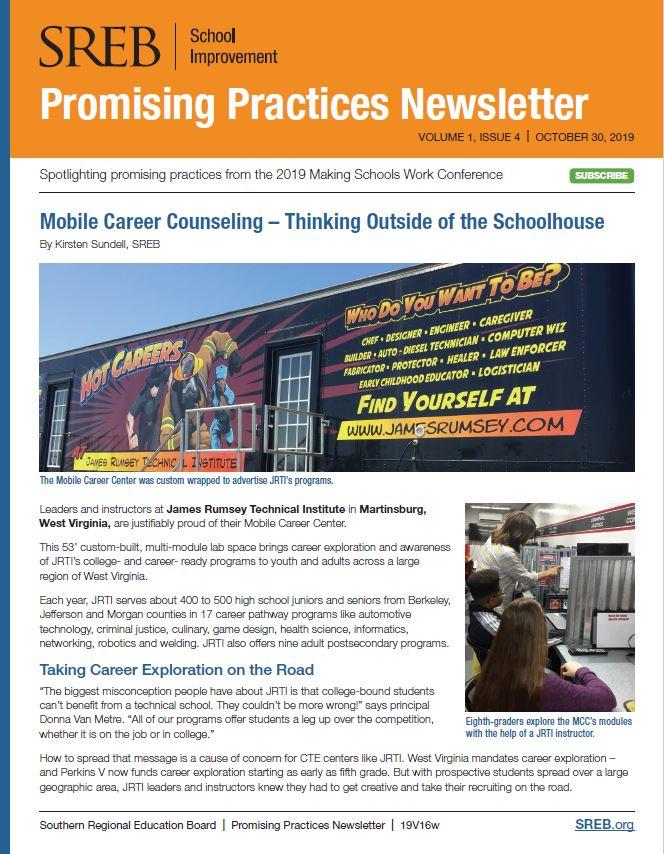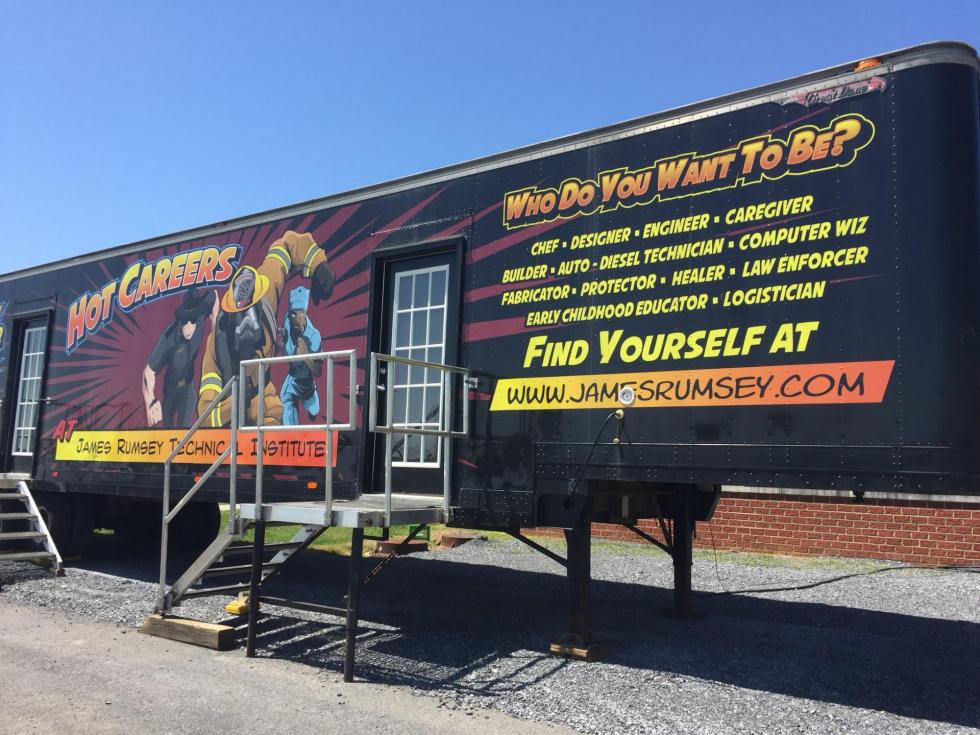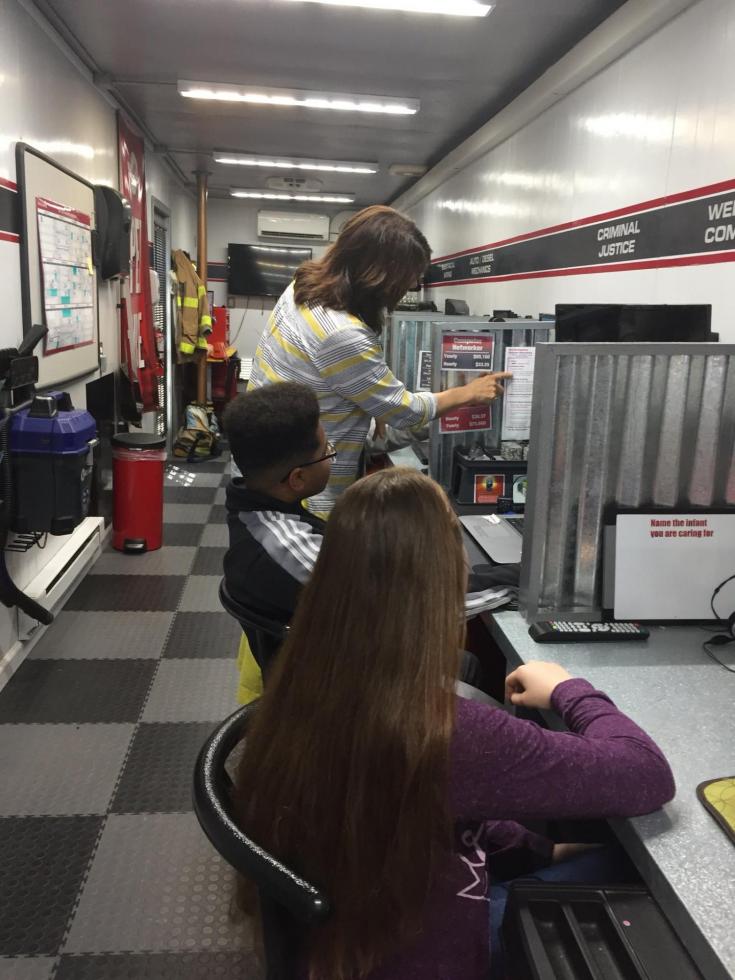Mobile Career Counseling — Thinking Outside the Schoolhouse
Promising Practices From the 2019 Making Schools Work Conference
 Leaders and instructors at James
Rumsey Technical Institute in Martinsburg, West Virginia, are
justifiably proud of their Mobile Career Center.
Leaders and instructors at James
Rumsey Technical Institute in Martinsburg, West Virginia, are
justifiably proud of their Mobile Career Center.
This 53’ custom-built, multi-module lab space brings career exploration and awareness of JRTI’s college- and career- ready programs to youth and adults across a large region of West Virginia.
Each year, JRTI serves about 400 to 500 high school juniors and seniors from Berkeley, Jefferson and Morgan counties in 17 career pathway programs like automotive technology, criminal justice, culinary, game design, health science, informatics, networking, robotics and welding. JRTI also offers nine adult postsecondary programs.
Taking Career Exploration on the Road
“The biggest misconception people have about JRTI is that college-bound students can’t benefit from a technical school. They couldn’t be more wrong!” says principal Donna Van Metre. “All of our programs offer students a leg up over the competition, whether it is on the job or in college.”
How to spread that message is a cause of concern for CTE centers like JRTI. West Virginia mandates career exploration – and Perkins V now funds career exploration starting as early as fifth grade. But with prospective students spread over a large geographic area, JRTI leaders and instructors knew they had to get creative and take their recruiting on the road.
 JRTI’s Mobile Career Center was
originally launched about 30 years ago. Because JRTI cannot use
instructional dollars to continually update the center and
achieve its vision for career counseling, leaders and instructors
have reached out to fellow instructors and industry partners
to secure, build and equip the trailer with computers,
televisions and industry-standard technical equipment.
JRTI’s Mobile Career Center was
originally launched about 30 years ago. Because JRTI cannot use
instructional dollars to continually update the center and
achieve its vision for career counseling, leaders and instructors
have reached out to fellow instructors and industry partners
to secure, build and equip the trailer with computers,
televisions and industry-standard technical equipment.
To keep costs low, JRTI instructors provide equipment and technical support for the MCC’s 13 swappable modules. Industry partners help with equipment and set-up – one company didn’t just donate a large AC unit, they also installed it. Leaders in Berkeley, Jefferson and Morgan counties installed 100 amp electrical drops at school sites to power the MCC.
That power is needed in modules like the center’s welding station. “Eighth-graders are doing real welding – not a simulation, and we’ve never had an injury,” says Van Metre. Besides welding, other activities in the MCC include, for example, explorations of criminal justice, early childhood education and game coding. Students interested in culinary careers can make and bake a pizza. Students intrigued by fire and emergency services don full firefighting gear and carry cinderblocks in buckets to simulate the heavy physical demands of a firefighting career.
Modules for robotics and drones are coming soon, reports Chuck McClain, the MCC’s visionary coordinator and a CTE instructor at JRTI. One of JRTI’s instructors recently acquired a Federal Aviation Administration Remote Pilot Certificate.
How It Works
The MCC is staffed through a 220-day instructor position with flexible scheduling that allows McClain to travel throughout the year to middle grades schools, high schools and community events to showcase JRTI’s programs.
In a typical middle grades school visit, McClain sends a schedule
and educational materials like videos in advance so that
eighth-graders, teachers and counselors can prepare.
Professionally produced and student-produced videos
introduce students to JRTI’s programs and CTE’s power to
open doors to great careers. Students review these materials and
choose
which modules they want to explore in the MCC.
 Because modules can be swapped in
and out of the MCC according to students’ preferences, 90 percent
of students get their first choice. During the visit, groups of
10 students at a time spend 90 minutes to two hours completing an
immersive, hands-on project. Afterward, McClain uses iPads to
gather exit survey data about students’ experiences.
Because modules can be swapped in
and out of the MCC according to students’ preferences, 90 percent
of students get their first choice. During the visit, groups of
10 students at a time spend 90 minutes to two hours completing an
immersive, hands-on project. Afterward, McClain uses iPads to
gather exit survey data about students’ experiences.
McClain and the MCC also visit eight regional high schools to introduce students to JRTI. Partnering with a school counselor, McClain speaks to every 10th-grade English class about career pathway opportunities. Other outreach efforts include Open Houses in the center at youth events and county fairs. McClain notes that many of the people who visit the MCC at county fairs are adults looking for a career change. JRTI also runs a summer career academy for rising ninth- and 10th-graders.
The MCC annually serves 2,400 students, and Van Metre personally meets with administrators and superintendents in all three counties to share accountability data on the MCC’s effectiveness.
Next Steps for JRTI
In the future, JRTI leaders and instructors want to make the center more accessible. Currently, some modules can be taken out of the MCC to accommodate students with disabilities. JRTI staff hope to secure funding for a new trailer with ramps and room for wheelchairs to better serve JRTI’s community. JRTI leaders welcome new partnerships with business and industry in the region.
Contact(s): Chuck McClain, ctmcclai@k12.wv.us; Donna Van Metre, dvanmetre@k12.wv.us; or @JamesRumseyTech on Twitter.

